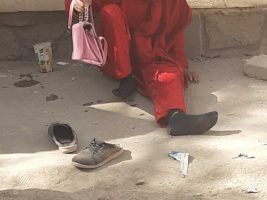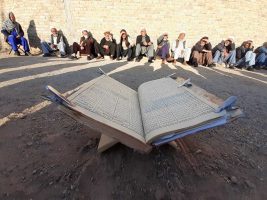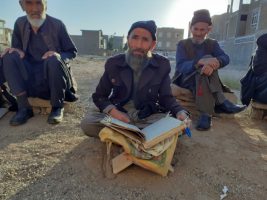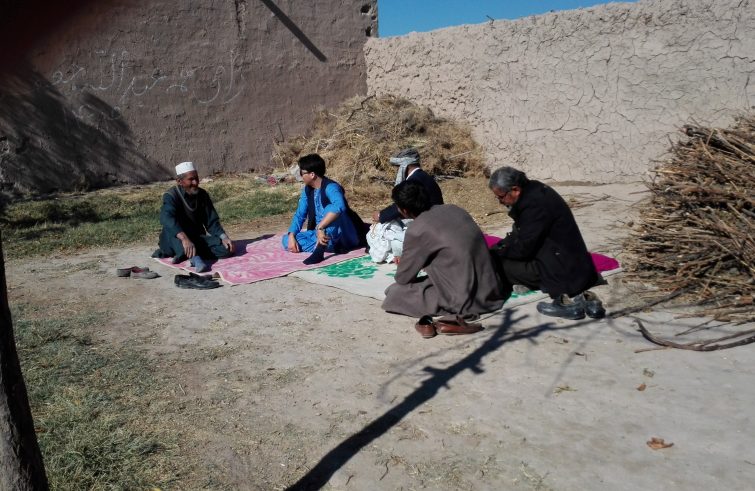
(Herat) It’s a quiet and peaceful December morning. Fridays went by without the casualties and deaths that have become the norm for the people of Afghanistan. The city of Herat is very pleasant for a stroll, children are playing in the streets, each of them creatively inventing a new game because many public parks are still closed or have limited access to families and men.
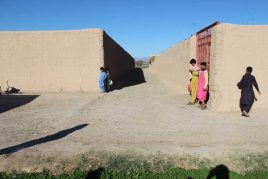 I went out of the house and swung the door open to the Hazara quarter in Jibrail, where a large number of Hazaras (members of the Afghan ethnic minority group, belonging to the Shiite tradition) emigrated to seek refuge from their places of birth. They live in old villages whose farmers were affected by torrential rainstorms this summer, destroying their crops entirely. Speaking about the transformation of their land, they told me: “as we walked out the door or looked out the window, we could no longer recognize our farmland because the storm had scattered thousands of stones throughout, and all our crops were washed away, swept into other distant lands – trees, cows, goats, sheep, chickens. Our houses were covered with rubble. There was no one left except for a few people who had taken refuge in a cave. There wasn’t the usual lightning in the skies, but constant thunder, which showed no mercy for us peasants. The storm appeared to have started from our homes; we sent messages to the villages further down the valley, where the sun was still shining, urging them to leave their homes and take shelter high up in the mountains. The branches of the trees made a small movement and then disappeared beneath violent blasts of wind. The next day, when the sun finally shone on us too, many villagers started looking for the trees on their properties, just the trees because animals were already carcasses. The storm had damaged the trunks of their trees, which made them unidentifiable. The floods brought about by heavy rainfall during the week had washed away their homes. Thunder had violently affected these Afghan villages, after 40 to 42 years of tranquillity. It felt like everything had to be restored.” Today, in this district, everyone has to invent a job to survive. The alternative is that they leave their families and move to Iran or Pakistan. All of Herat is surrounded by mountain ranges, characterised by a diversity of languages spoken by the various ethnic groups and by the diversity of faiths. Yet a constant celebration takes place, involving the new arrivals and their hosts, the farmers initially celebrating the narrow escape from danger, mingling their customs, traditions and foods, only to become aware of the financial difficulties day after day. Those with money live well here and those without start to experience a feeling of despair. It’s by no means a new problem, in fact I wrote about this transformation and intermingling in my book Il Tappeto Afghano (“The Afghan Carpet”).
I went out of the house and swung the door open to the Hazara quarter in Jibrail, where a large number of Hazaras (members of the Afghan ethnic minority group, belonging to the Shiite tradition) emigrated to seek refuge from their places of birth. They live in old villages whose farmers were affected by torrential rainstorms this summer, destroying their crops entirely. Speaking about the transformation of their land, they told me: “as we walked out the door or looked out the window, we could no longer recognize our farmland because the storm had scattered thousands of stones throughout, and all our crops were washed away, swept into other distant lands – trees, cows, goats, sheep, chickens. Our houses were covered with rubble. There was no one left except for a few people who had taken refuge in a cave. There wasn’t the usual lightning in the skies, but constant thunder, which showed no mercy for us peasants. The storm appeared to have started from our homes; we sent messages to the villages further down the valley, where the sun was still shining, urging them to leave their homes and take shelter high up in the mountains. The branches of the trees made a small movement and then disappeared beneath violent blasts of wind. The next day, when the sun finally shone on us too, many villagers started looking for the trees on their properties, just the trees because animals were already carcasses. The storm had damaged the trunks of their trees, which made them unidentifiable. The floods brought about by heavy rainfall during the week had washed away their homes. Thunder had violently affected these Afghan villages, after 40 to 42 years of tranquillity. It felt like everything had to be restored.” Today, in this district, everyone has to invent a job to survive. The alternative is that they leave their families and move to Iran or Pakistan. All of Herat is surrounded by mountain ranges, characterised by a diversity of languages spoken by the various ethnic groups and by the diversity of faiths. Yet a constant celebration takes place, involving the new arrivals and their hosts, the farmers initially celebrating the narrow escape from danger, mingling their customs, traditions and foods, only to become aware of the financial difficulties day after day. Those with money live well here and those without start to experience a feeling of despair. It’s by no means a new problem, in fact I wrote about this transformation and intermingling in my book Il Tappeto Afghano (“The Afghan Carpet”).
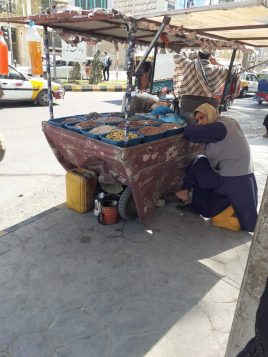 Until we lack the freedom to travel and get to know the world, everyone will assume that this summer’s nightmare is over, instead it has just begun, just like this dry, stone-cold autumn wind. I have no desire to celebrate, neither for this strange season, nor would I want to delude myself over what has just ended. I would like to write, write as long as my pen is in my pocket, like my suitcase that is always prepared, ready to leave for Italy, where I left dear relatives and friends. However, I also wish to return here where my heart dwells with more serenity, because it is familiar with the many difficulties of everyday existence by now. I walk through the fog and pretend I am in Venice, but I’m not: I am here, walking across the mud of this city, sensing familiar fragrances, stories I have heard a thousand times before during my childhood.
Until we lack the freedom to travel and get to know the world, everyone will assume that this summer’s nightmare is over, instead it has just begun, just like this dry, stone-cold autumn wind. I have no desire to celebrate, neither for this strange season, nor would I want to delude myself over what has just ended. I would like to write, write as long as my pen is in my pocket, like my suitcase that is always prepared, ready to leave for Italy, where I left dear relatives and friends. However, I also wish to return here where my heart dwells with more serenity, because it is familiar with the many difficulties of everyday existence by now. I walk through the fog and pretend I am in Venice, but I’m not: I am here, walking across the mud of this city, sensing familiar fragrances, stories I have heard a thousand times before during my childhood.
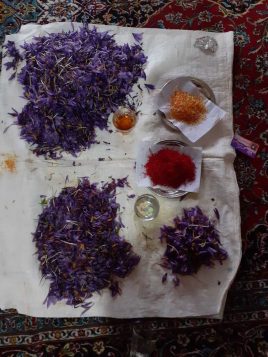 Many women cultivate sweet flowers, the saffron flowers that we were familiar with since childhood: their petals seem to have stolen butterflies’ whiskers and eyelashes. For these flowers, each woman earns 40/50 cents a kilo. Some people arrive with sunflower seeds, almonds, peanuts, raisins, dried apricots, grown and harvested by them. Afghanistan is a country rich in this kind of dried fruit. The sellers often fall asleep out of exhaustion, but then make an effort to stand up. I wander along these streets and I am touched as I see that people continue to have hope even at such a difficult time for the Afghan economy. I am regularly brought back home by a driver who was born in this city and is familiar with each tiny street without the support of GPS navigation device. As we return to our neighbourhood, he says: “nobody used to care about this part of the city, because of its strong winds, the quantity of sand and dust that reached the houses in the summer. It was a desert, but now it’s becoming the place that most penetrates our hearts.” A group of drug addicts sit huddled in the street, clinging to each other beneath a veil, without a voice.
Many women cultivate sweet flowers, the saffron flowers that we were familiar with since childhood: their petals seem to have stolen butterflies’ whiskers and eyelashes. For these flowers, each woman earns 40/50 cents a kilo. Some people arrive with sunflower seeds, almonds, peanuts, raisins, dried apricots, grown and harvested by them. Afghanistan is a country rich in this kind of dried fruit. The sellers often fall asleep out of exhaustion, but then make an effort to stand up. I wander along these streets and I am touched as I see that people continue to have hope even at such a difficult time for the Afghan economy. I am regularly brought back home by a driver who was born in this city and is familiar with each tiny street without the support of GPS navigation device. As we return to our neighbourhood, he says: “nobody used to care about this part of the city, because of its strong winds, the quantity of sand and dust that reached the houses in the summer. It was a desert, but now it’s becoming the place that most penetrates our hearts.” A group of drug addicts sit huddled in the street, clinging to each other beneath a veil, without a voice.
- Afghanistan, bambino a Herat (Foto Gholam Najafi)
- Afghanistan, (Foto Gholam Najafi)
- Afghanistan, (Foto Gholam Najafi)

